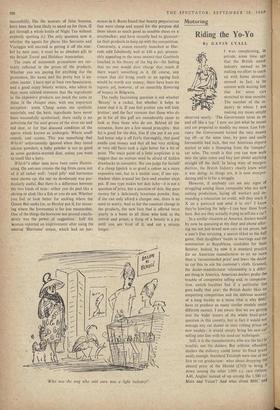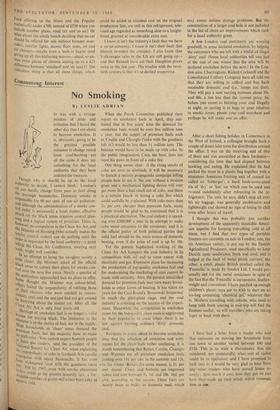Motoring
Riding the Yo-Yo
By GAVIN LYALL
I WAS complaining, in private, some time ago that the British motor industry seemed to be making no effort to catch up with home demand; seemed in fact, to be content with waiting lists that for some cars stretched to nine months. The member of the in- dustry to whom I was making my moan simply observed sourly: 'The Government turns us on and off like a tap.' I now see just what he means and am prepared to modify my moan. Last Feb- ruary the Government turned the easy money tap off—at the same time, by pure and easily foreseeable bad luck, that our American exports started to take a thumping from the 'compact' car sales. The result is that you can now walk into the sales room and buy just about anything straight off the shelf. In being wary of overpro- duction, the British Industry clearly knew what it was doing; as things are, it is now overpro- ducing and is in for a struggle.
However, if anybody can see any signs of struggling among those companies who are noW cutting production, laying off workers and de- manding a relaxation on credit, will they mark it X on a postcard and send it to me? I knoW they're howling for help—I can hear them from here. But are they actually trying to sell me a car?
In a similar situation in America, dealers would by now be queueing at my door and phone offer- ing me not just brand new cars at cut prices, but a year's free servicing, a season ticket to the ball game, their daughters' hands in marriage and the nomination as Republican candidate for State Senator. Indeed, by now it is standard practice for an American manufacturer to set no more than a 'recommended price' and leave the dealer to cut this to suit his customer's cloth. Granted, the dealer-manufacturer relationship is a differ- ent thing in America. American dealers prefer the trouble of competitive selling and, in compensa- tion, switch loyalties fast if a particular line goes badly that year; the British dealer likes no unsporting competition and the dubious security of a long loyalty to a name (this is why BMC have to produce so many similar models under different names). I am aware that we are getting into the wider waters of the whole fixed-price question in this country, but in fact it would not outrage any car dealer to start cutting prices on new models: it would simply bring his new-car selling into line with his used-car techniques.
Still, it is the manufacturers who are (so far) in trouble, not the dealers. But without offending / dealers the industry could lower its fixed prices',1 easily enough. Standard-Triumph were one of the first to cut production: what about dropping the* absurd price of the Herald (£702) to bring it down among the other 1,000 c.c. cars (Minor, A40, Anglia) instead of up among the 1,500 c.c. Minx and Victor? And what about BMC and Ford offering us the Minis and the Popular realistically under £500, instead of £530 when you Include number plates, road tax and so on? Or What about the whole bunch deciding that no car should be offered for sale without bumper over- riders, interior lights, decent floor mats, oil and air cleaners—maybe even a built-in heater (and giving up all this blithering non.ensz about seven- teen extra pieces of chrome adding up to a £25 difference between 'standard' and `de luxe)? The ridiculous thing is that all these things, which could be added at minimal cost on the original production line, are still in this refrigerated, tele- vised age regarded as something akin to a knight- hood, granted at considerable extra cost.
1 know it isn't the industry's fault that we have a yo-yO economy; 1 know it isn't their fault that Detroit invented the compact. I also know that Volkswagen sales in the US are still going up— and that Renault have cut their Dauphine prices twice in the last year. The trouble with the twen- tieth century is that it's so dashed unsporting.











































 Previous page
Previous page